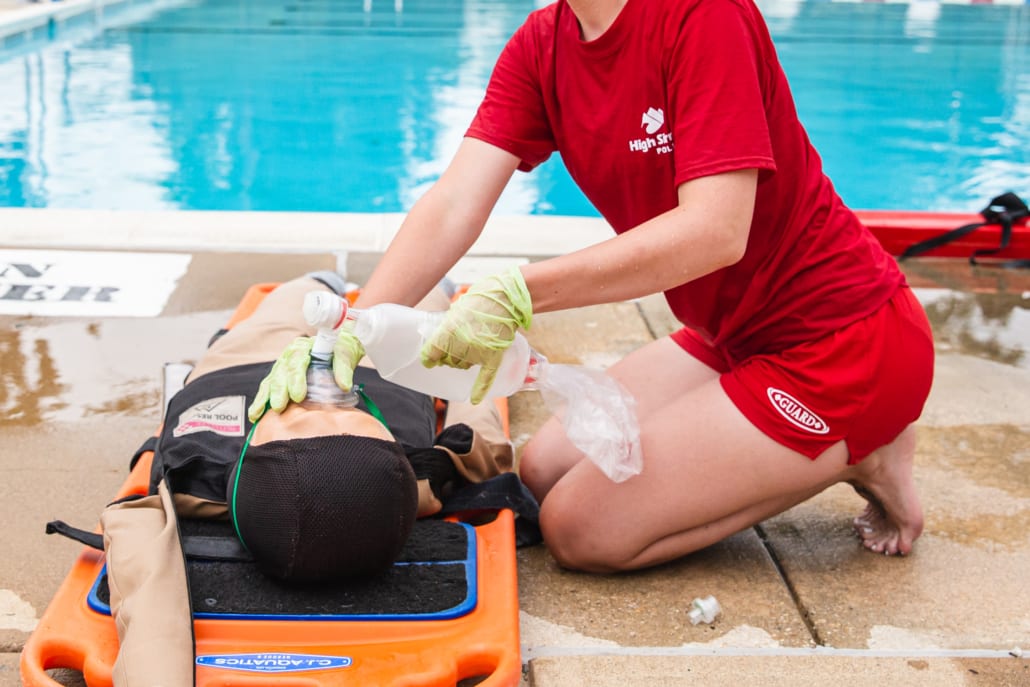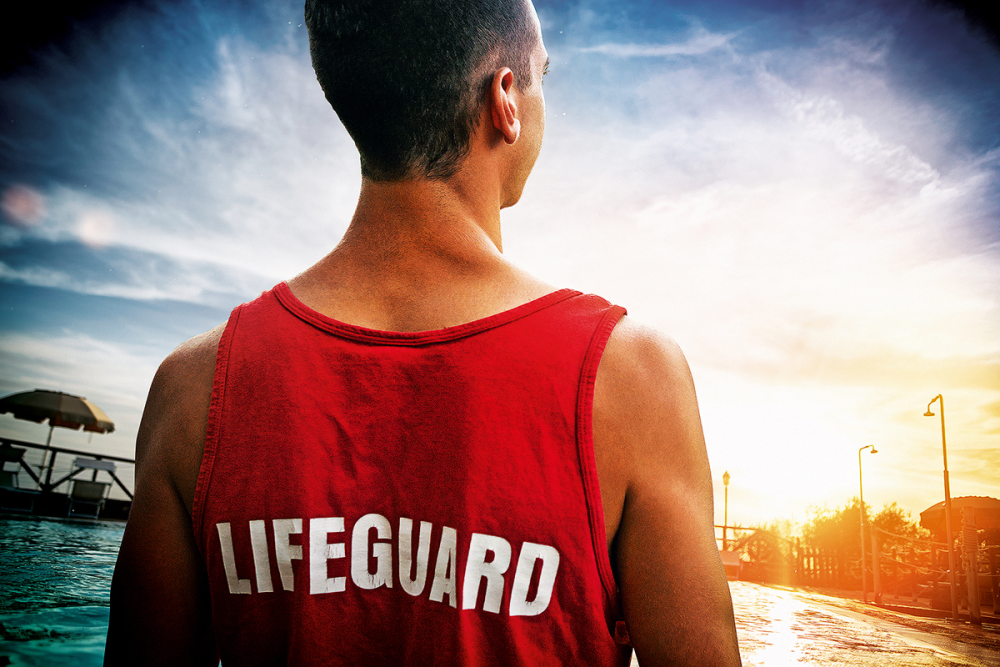Understanding how to become a lifeguard begins with being a strong swimmer and completing a certified training course, such as the National Pool Lifeguard Qualification (NPLQ) or the National Beach Lifeguard Qualification (NBLQ). Next, you’ll need to pass a fitness test demonstrating your swimming and rescue skills and obtaining current first aid and CPR certifications. Once qualified, you can apply for lifeguard positions at pools, beaches, or water parks. Staying physically fit and participating in ongoing training will help you thrive in this rewarding role.
What Are the Main Types of Lifeguards?
Lifeguards are responsible for ensuring the safety of swimmers and beachgoers, preventing accidents, and providing rescue services when necessary. Depending on their environment, lifeguards can specialise in various settings, each with its unique requirements. Here are the main types of lifeguards:
- Pool Lifeguard: Pool lifeguards maintain a safe environment at indoor and outdoor swimming pools. They enforce rules, manage overcrowding, and conduct safety drills regularly. Monitoring water quality and cleanliness is also part of their duties. They often provide swimming lessons to promote safe swimming habits.
- Sea Lifeguard: Sea lifeguards monitor beachgoers for potential dangers like strong currents and submerged obstacles. They conduct regular patrols and respond quickly to emergencies. Education on safety measures, such as recognising rip currents, is a key part of their role. Their vigilance helps ensure a safe environment for swimmers.
- Fitness Centre Lifeguard: In fitness centres, lifeguards ensure the safety of patrons during various activities. They monitor pool areas for unsafe behaviour and provide first aid when needed. Their presence encourages safe practices and awareness among gym-goers. Lifeguards also educate users on equipment safety to prevent injuries.
- Beach Lifeguard: Beach lifeguards protect coastal areas from hazards like currents and marine life. They assess environmental conditions and respond to emergencies like drownings. Collaborating with local authorities, they promote beach safety through community outreach. Their proactive measures ensure a safe experience for beachgoers.
- Water Park Lifeguard: Water park lifeguards oversee safety in crowded environments with various attractions. They manage activities in wave pools, lazy rivers, and water slides. Their training prepares them for high-stress situations and quick rescues. Engaging with guests helps promote safety awareness and adherence to rules.
- Open-Water Lifeguard: Open-water lifeguards work in unpredictable environments like lakes and rivers. They monitor water sports activities, ensuring participants follow safety protocols. Their training equips them to handle emergencies like capsized boats or swimmer fatigue. Conducting safety briefings is essential to promote responsible water use.
- Surf Lifeguard: Surf lifeguards are trained to handle unique challenges in surfing environments. They monitor surfers for signs of distress and understand ocean dynamics. Their expertise includes advanced rescue techniques tailored for surf conditions. Educating beachgoers on safe practices enhances overall safety at the beach.
- Head Lifeguard: The head lifeguard oversees the entire lifeguard team and daily operations. Responsibilities include scheduling, training, and supervising staff during emergencies. They liaise with management and emergency services to ensure safety protocols are followed. Continuous evaluation and feedback help improve safety practices.
What Does a Lifeguard Do?
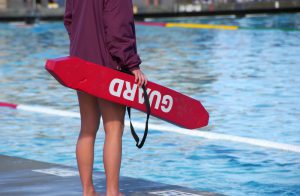
The lifeguard is responsible for the safety of people participating in water activities, whether in a swimming pool or open water. They frequently perform rescues, provide first aid, and enforce safety rules. Here is an overview of the main responsibilities of a lifeguard:
- Watch the Water: Lifeguards monitor the water to ensure everyone’s safety. They look for swimmers in trouble, including those who may be drowning or injured. Their readiness to jump in can make a crucial difference. Vigilance is key to preventing accidents.
- Enforce Safety Rules and Guidelines: While on duty, lifeguards enforce safety rules and guidelines. This includes preventing running near the pool and diving in shallow water. They also ensure swimmers don’t enter restricted areas. Consistent enforcement promotes a safe environment.
- Rescue Swimmers in Distress: When a swimmer is in trouble, lifeguards are trained to perform rescues. They utilise rescue equipment like flotation devices and reaching poles. Quick action is essential to assist those in need. Lifeguards are prepared for various rescue scenarios.
- Provide First Aid: Lifeguards are often the first responders to medical emergencies. They administer first aid, including cardiopulmonary resuscitation (CPR). If necessary, they use automated external defibrillators (AEDs). Their prompt response can save lives.
- Prevent Drowning: Lifeguards actively look for potentially dangerous situations. This includes monitoring swimmers venturing into unsafe depths or children swimming unattended. Their vigilance is crucial in preventing drownings. Proactive measures help ensure safety.
- Maintain Pool and Beach Safety: In addition to monitoring swimmers, lifeguards oversee environmental factors. They assess water conditions and weather patterns that may pose risks. Ensuring the cleanliness of pools is also vital. Reporting hazards is part of their responsibility.
- Assist with Emergency Evacuations: In the event of severe weather, fire, or other emergencies, lifeguards assist in evacuating swimmers. They ensure everyone safely exits the water and surrounding areas. Coordination during emergencies is essential for safety. Their leadership helps manage crisis situations.
Average Lifeguard Salary

Lifeguard salaries in the UK vary depending on years of experience, the environment in which they work, and specific job roles. Here is an overview of typical lifeguard salaries:
- Entry-Level Lifeguard: Entry-level lifeguards typically earn between £18,000 and £21,000 annually. Hourly rates for part-time or seasonal lifeguards range from £8 to £11 per hour.
- Qualified Lifeguard: A trained lifeguard’s salary ranges from £21,000 to £26,000 annually. Additional qualifications, such as those for working at the beach or a water park, can command slightly higher rates.
- Head Lifeguard: Head lifeguards, who supervise a team, can earn between £25,000 and £30,000 annually, depending on the size of the team and the location of the facility.
Essential Skills of a Lifeguard
A lifeguard is someone in good physical condition, possesses the necessary water skills, and can perform under pressure. The skills required for a lifeguard job include strong swimming ability, observational skills, first aid and CPR training, physical fitness, the ability to remain cool under pressure, effective communication skills, and a thorough understanding of water safety knowledge. The following are the key skills needed for a career as a lifeguard:
- Strong Swimming Ability: Lifeguards should be strong swimmers who can move swiftly through the water and cover long distances. They must also be able to swim with rescue equipment and carry swimmers to safety.
- Observational Skills: Lifeguards need to be vigilant and possess keen observational skills. They must scan the water for signs of distress, fatigue, or unsafe behaviour and take action to prevent accidents.
- First Aid and CPR Skills: Lifeguards are trained in first aid and CPR, as well as the use of AEDs (automatic external defibrillators). These skills are vital for providing immediate care in emergency situations.
- Physical Fitness: Lifeguards must be in excellent physical condition to withstand the rigours of the job, which include swimming long distances, pulling swimmers from the water, and performing rescues in dangerous conditions.
- Calmness Under Pressure: Lifeguards must remain calm and focused during emergencies. They need to make quick decisions and respond effectively in high-pressure situations.
- Communication Skills: Lifeguards require good communication skills to warn swimmers, interact with co-workers and emergency services about issues, provide clear instructions to swimmers, and coordinate with teammates during rescues.
- Water Safety Knowledge: Lifeguards must have a thorough understanding of the rules and procedures regarding water safety and know how to react in emergencies. Good lifeguards are proactive in preventing problems and know how to respond effectively if something does go wrong.
Lifeguard Tips
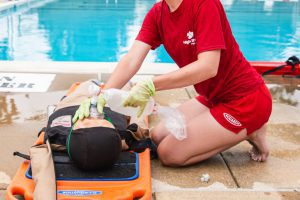
Here are some practical tips for aspiring lifeguards:
- Swimming Lessons: Build confidence and proficiency in various swimming techniques, including freestyle and backstroke. Train in different environments, such as pools and open water, to prepare for diverse conditions. Join advanced swimming courses or teams to enhance your skills. Endurance swimming practice is key for effective rescues.
- CPR/First Aid Certification: Obtain your National Pool Lifeguard Qualification (NPLQ) or National Beach Lifeguard Qualification (NBLQ) through reputable courses. These certifications teach essential lifesaving techniques, including CPR and first aid. Regularly renew your qualifications to stay updated with the latest practices. Hands-on training ensures readiness for emergencies.
- Stay Fit Physically: Maintain a high level of fitness through regular swimming, strength training, and cardiovascular workouts. Incorporate cross-training activities like running or cycling for variety and improved endurance. A balanced diet and proper hydration are crucial for peak performance. Consistent fitness helps you handle the demands of lifeguarding.
- Practice First Aid Skills: Regularly refresh your first aid and CPR skills to respond effectively in emergencies. Participate in drills and simulations to build confidence and familiarity with emergency equipment. Keep your knowledge current through refresher courses. Quick and effective action can be vital in life-threatening situations.
- Learn to Remain Calm: Practice stress management techniques like deep breathing and mindfulness to stay composed in emergencies. Engage in role-playing exercises to simulate high-pressure scenarios. Develop clear communication skills for coordinating responses. Staying calm enhances decision-making during critical moments.
- Understand Water Conditions: Understand the effects of tides, currents, and waves on water safety as a beach or open-water lifeguard. Learn to identify rip currents and hazardous conditions, and stay informed about weather patterns. This knowledge aids in preventing accidents and providing guidance. Engage with experienced lifeguards to deepen your understanding.
Lifeguard Requirements
If you want to work as a lifeguard in the UK, you must meet specific qualifications and training requirements. This essay outlines what these requirements are. To become a qualified lifeguard, you need to undergo targeted training.
Firstly, to be employed as a lifeguard, you must be at least 16 years old and have a valid swimming pool safety certificate. Additionally, you are required to complete a certified lifeguard course designed to help you understand and manage accidents and emergencies effectively.
Secondly, a lifeguard must obtain two essential certificates: a Basic Life Support certificate and a First Aid certificate. Lifeguards are trained to provide assistance in emergencies and save lives, and these certificates validate their knowledge of first aid.
In conclusion, if you aspire to be a lifeguard, you must pass certain requirements and undergo specific training. Here’s an overview of the typical requirements to become a lifeguard:
- Be a Strong Swimmer: Lifeguards must be strong swimmers capable of swimming long distances, treading water, and rescuing others in challenging situations. You will need to pass a swimming test to qualify as a lifeguard.
- National Pool Lifeguard Qualification (NPLQ): This is the basic qualification for lifeguards working around swimming pools in the UK. The NPLQ covers water rescues, first aid, CPR, and pool safety regulations. The course takes 36–40 hours to complete and includes both practical and theoretical examinations.
- National Beach Lifeguard Qualification (NBLQ): If you want to work as a beach lifeguard, you will need the NBLQ. This qualification provides more specific training in beach rescues, surf safety, and open water conditions. It is a slightly longer course than the NPLQ and includes additional training on dealing with tides, currents, and marine life.
- First Aid and CPR Certification: Lifeguards must be certified in first aid and CPR. While they often obtain these certifications during lifeguard training, they must renew them every few years to remain current.
- Physical Fitness Test: Most lifeguard training courses include a physical fitness test to ensure you can perform rescues effectively. You will need to demonstrate your swimming ability, strength, and stamina.
How to Become a Lifeguard
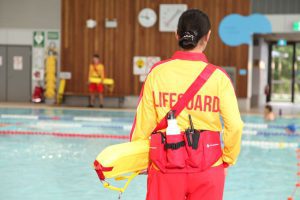
Here’s a step-by-step guide to becoming a lifeguard in the UK:
- Be a Strong Swimmer First: Ensure your swimming abilities are adequate. Lifeguards need to be proficient swimmers. If you are not a strong swimmer, consider taking advanced swimming lessons.
- Become a Lifeguard Certified: Enrol in a National Pool Lifeguard Qualification (NPLQ) or National Beach Lifeguard Qualification (NBLQ) course. These certifications cover water rescue techniques, first aid, CPR, and safety standards. Courses include both theoretical and practical training to ensure preparedness. Completing this certification enhances your employability as a lifeguard.
- Pass the Fitness Test: Prepare for a physical fitness test during lifeguard training that assesses your swimming ability and endurance. This typically includes swimming laps, treading water, and performing rescues. Create a structured fitness regimen focusing on swimming drills and strength training. Regular practice builds the physical resilience necessary for the job.
- Get First Aid and CPR Certification: Obtain current first aid and CPR certification, essential for responding to emergencies. These skills help you manage injuries, cardiac events, and drowning incidents effectively. Ensure your certifications are renewed regularly to stay up to date. Consider additional workshops to enhance your knowledge and skills.
- Begin Applying for Lifeguard Positions: Once trained and certified, start applying for lifeguard positions at pools, beaches, and recreation centres. Prepare a strong CV highlighting your qualifications and relevant experience. Network with other lifeguards and inquire about openings in your community. Being proactive increases your chances of finding a position.
- Stay Fit Physically: Maintain top physical condition throughout your lifeguarding career to perform effectively. Engage in a balanced fitness routine that includes swimming, strength training, and cardio exercises. Regular swimming enhances your technique and endurance, while varied activities keep your routine engaging. Staying fit sets a good example for the public.
- Continue Professional Development: Maintaining your certifications requires continuous training. Lifeguards should participate in refresher courses and renew their certifications as needed, staying up to date with new safety and rescue protocols.
Get Qualified as a Lifeguard
Lifeguard Techniques Workshop, Lifeguard Certification Program, Comprehensive Lifeguard Training, Lifeguard Essentials
Frequently Asked Questions
Why Should You Become a Lifeguard?
Lifeguarding is a rewarding career that offers a sense of adventure while allowing you to help others. Lifeguards save lives, educate the public about water safety, and work in various environments, including pools, beaches, and water parks. In this role, you can acquire valuable skills in emergency response, leadership, and teamwork, which are applicable to other careers. The work hours are flexible, and seasonal positions are available, making lifeguarding a great fit for students or those seeking part-time employment.
Is Being a Lifeguard a Good Career Choice for You?
As a lifeguard, you have the opportunity to swim, work outdoors (or at public pools), and engage in your passion for water safety. Strong swimmers who remain calm under pressure will thrive in this profession. Consider this career if you enjoy the physical demands of the job and want to work in a role where you can help people daily by preventing accidents and saving lives during emergencies.
Lifeguard Salaries
Lifeguard salaries in the UK can vary from £18,000 to £30,000 per year, depending on individual experience and the region where they are employed. Entry-level lifeguards typically earn between £18,000 and £21,000 annually. Experienced lifeguards or head lifeguards can earn between £25,000 and £30,000 per year. Hourly rates for part-time lifeguards range from £8 to £12, with higher rates available for those working in specialised environments such as beaches or water parks.
Which Qualifications Can Help with a Career as a Lifeguard?
If you want to work as a lifeguard in the UK, you will need to complete a course and pass the National Pool Lifeguard Qualification (NPLQ) for pools or the National Beach Lifeguard Qualification (NBLQ) for beaches. Training covers water rescue, CPR, and first-aid skills, and these qualifications are recognised nationally. You must recertify every two years to maintain your qualification.
Do I Need Experience to Get Started as a Lifeguard?
You don’t need any specific experience to become a lifeguard; you simply need to complete the theory courses and pass the fitness test. Being a strong swimmer and maintaining composure in high-pressure situations is essential. Once qualified, gaining experience at a small pool or leisure centre can be beneficial before moving on to larger or more challenging environments, such as beaches or water parks.
Lifeguard Career Outlook
Lifeguards are always in demand, particularly during the summer and in tourist areas with beaches or water parks. Pools and recreational centres also hire lifeguards year-round. Those with first aid, CPR, or sports instruction certifications may have more job opportunities and a better chance to advance their careers.
Lifeguard Hierarchy and Progressing Within the Role
Lifeguards can advance their careers by gaining experience, completing additional certifications, and moving into supervisory roles. After a few years, lifeguards can become head lifeguards, overseeing teams and managing pool or beach operations. From there, they can progress to roles such as aquatics manager or recreation director, which involve managing entire facilities or recreational programmes.
Lifeguard Exit Options and Opportunities
Lifeguards acquire many transferable skills that can help them in other career paths, including emergency services, health and safety, and recreation management. Common progression options include becoming a paramedic, firefighter, or fitness trainer. Others may choose to become swimming instructors or water safety educators.

